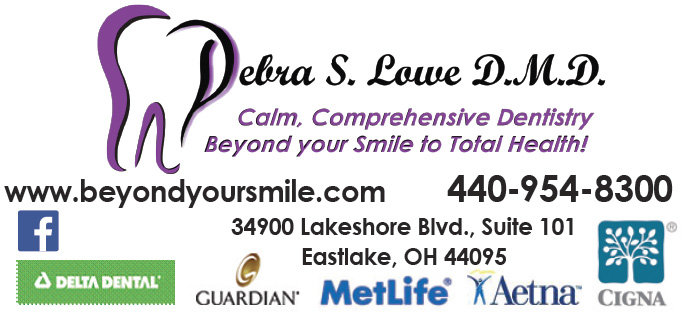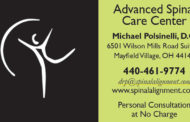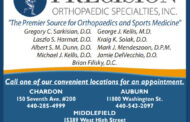By Debra S. Lowe, D.M.D.
Teeth are important to process our food for proper nutrition. Without good nutrition, we are not healthy.
Many people think it is OK to pull back teeth because “you can’t see them.” But they want to save the front because you can see them. Well they are all important.
The back teeth protect the front. The front teeth support the back teeth. Without back teeth, or even if they are worn down or broken, more force is placed on the front teeth. They become the grinders that they are not shaped to be. So they wear down, becoming unsightly, aged in appearance, sensitive (often needing root canals). They flare out as in “bucked teeth” and can loosen. All teeth provide support for facial muscles. Without support, the face droops and wrinkles, causing creased corners of the lips. The lower 1/3 of the face gets shorter, the chin pointier, that aged look.
When front teeth are not supporting the back teeth, the muscles of chewing and the temporomandibular joint (TMJ) are affected. The hardy eye tooth is supposed to separate the back teeth at a certain point of the grinding cycle, taking some pressure off the molars for a time, allowing the chewing muscles to momentarily rest. If not, the chewing muscles get overworked, go into spasm, and hurt. The muscle fibers shorten and tug at the muscles that wrap up over and to the back of the head. The result…soreness and a headache.
Missing teeth allow other teeth to tip and drift causing a misalignment of the jaws that can strain the jaw muscles, which connect to the cartilage of the TMJ. Damage to the joint disk can result. The muscles of the TMJ again strain the muscles of the head, causing headaches. The head muscles are connected to the neck muscles, the neck muscles are connected to the back muscles…leg muscles…feet.
You can see where I am going with this. Pain elsewhere in the body might be traced back to a mouth problem or vice versa, because everything is connected. When one muscle over compensates for another, things get strained.
Also a tipped tooth can cause gum disease pockets that harbor bacteria.
If you have a broken or chipped tooth, get it checked out. If you get headaches, especially upon wakening, see your dentist. Do your muscles get tired just chewing a mouthful of food? Call your dentist.
Only your dentist can assess the cause and the need for repair, in order to avoid future infections or TMJ problems. If it has been a long time since you had a dental exam and cleaning, or never had one, make an appointment. If you have been told that you have gum disease, or if family members have it, it is imperative to see your dentist regularly as advised.
We all need help cleaning our teeth, dentists included, because teeth have concavities and grooves where plaque escapes our brushes and floss. Decay and infections can result. A hygienist has the expertise and ability, and also the tools that are designed to reach these areas.
So please be diligent about your oral health. It does matter. Be sure to practice good brushing and flossing techniques twice a day. Visit your dentist at least twice a year, more if it is recommended, and ask about the correct hygiene techniques to be sure of them. X-rays are necessary to check for cavities between teeth and under fillings (cavities don’t always hurt and we can’t always see them by just looking or exploring ). X-rays also reveal abscesses, gum and bone disease, and cancer. They are an important tool to your oral diagnosis, as x-rays are to an orthopedic surgeon. Your dentist is trained to assess how often they are necessary as dictated by your dental and medical history. Without them on a periodic basis, you are not receiving a complete exam and assurance of health.
If you don’t have a dentist or are looking to change, we are here to help.
Come experience our spa-like, relaxing atmosphere where we cater to your mental and physical comfort, while providing dental care with excellence in mind. Call for an appointment.
A healthy smile does a body good!
– One American dies every hour from oral cancer- 7600 a year.
– About 39,500 Americans are diagnosed yearly.
– Anyone can get oral cancer.
Oral Signs/Symptoms:
– Red and/or white patch.
– Lump or thick patch in the mouth, throat, neck, lip.
– Ulcer or sore that won’t heal.
– Wart-like mass.
– Difficulty in swallowing (“something caught in the throat”),chewing, speaking.
– Bleeding in the mouth.
– Loose teeth.
– A swelling that causes a denture to be uncomfortable or ill-fitting.
– Long lasting hoarseness.
– Numbness of the mouth or face.
























